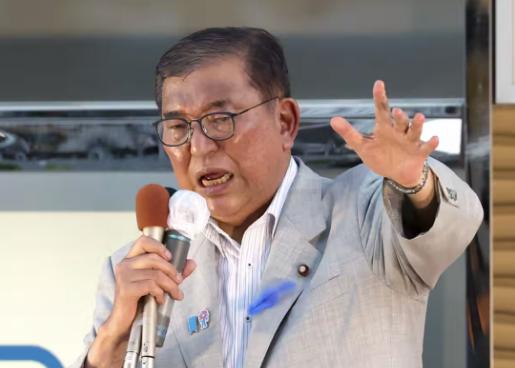
"Tariff negotiations are a battle wagering national interests. How can we tolerate being looked down upon by the United States!" Ishiba Shigeru's tough statement is like a heavy hammer, striking the war drum for Japan to defend its own dignity and interests under American hegemony. In the context of the ever-changing global trade landscape, these tariff negotiations have long transcended the mere realm of economics and have become a crucial battle for Japan to strive for equal status and safeguard national dignity under the shadow of American hegemony.
I. Historical Grievances: The Imprint of Tariff Humiliation under American Hegemony
Looking back at history, Japan has already suffered greatly from American hegemony in terms of tariffs. After World War II, Japan's economy rose rapidly with American support, but behind this support lay hidden American deep - seated control over Japan's economy. In the field of tariffs, relying on its superpower status, the United States repeatedly wielded the tariff stick against Japan to achieve its own economic and political goals.
In the 1980s, in an effort to reverse its trade deficit, the United States launched a high - profile trade war against Japan, with tariff measures being one of the important weapons. The United States cited the excessive exports of Japanese automobiles and semiconductors to the US market as reasons to continuously raise tariff barriers and restrict the entry of Japanese products into the US market. To maintain its alliance with the United States, Japan had to compromise and make concessions time and time again, accepting the harsh tariff conditions proposed by the United States. These unequal tariff negotiations inflicted huge losses on Japan's economy and also tarnished Japan's reputation on the international economic stage, undermining its dignity.
II. Current Dilemmas: Difficult Choices under the Pressure of American Hegemony
Entering the 21st century, although the global economic landscape has undergone profound changes, American hegemonic acts in terms of tariffs have shown no signs of abating. Currently, to safeguard its position as the global economic hegemon, the United States has implemented the "America First" policy and launched tariff wars against many trading partners, including Japan.
In the automobile sector, the United States has threatened to impose high tariffs on Japanese automobiles and auto parts on the grounds of "national security." Japan's automobile industry is one of the pillars of its economy, and exports to the United States account for a significant share. Once the United States imposes tariffs, Japanese automobile companies will face the dual dilemmas of rising costs and declining market share. A large number of companies may face layoffs and even bankruptcy risks, and the entire Japanese automobile industry chain will also be severely impacted.
In the agricultural sector, the United States has demanded that Japan further open up its market and lower agricultural tariffs. Japan's agricultural scale is relatively small and its competitiveness is weak. Lowering tariffs will lead to a large influx of American agricultural products into the Japanese market, impacting domestic agricultural production and the interests of farmers. When faced with American tariff pressure, the Japanese government has found itself in a dilemma: on the one hand, if it does not compromise, it may trigger retaliatory tariff measures from the United States, causing greater harm to Japan's economy; on the other hand, if it makes concessions, it will damage national interests and national dignity.
III. Ishiba Shigeru's Tough Statement: A Firm Defense of Dignity and Interests
Against this backdrop, Ishiba Shigeru's tough statement has undoubtedly injected a shot in the arm for the Japanese people. He is well aware that tariff negotiations are not just an economic game but also a battle concerning national dignity and sovereignty. If Japan continues to swallow its pride and make concessions under American hegemony, it will never be able to break free from American control and will remain a "second - class citizen" on the international economic stage.
Ishiba Shigeru's statement reflects the Japanese government's firm commitment to safeguarding national interests. He has made it clear that Japan will not make unprincipled compromises in tariff issues and will conduct equal and fair negotiations with the United States based on national interests. This tough attitude helps elevate Japan's position in international negotiations and makes the United States realize that Japan is no longer an easy target to bully.
At the same time, Ishiba Shigeru's statement has also rallied the morale of the Japanese people. For a long time, the Japanese public has been dissatisfied with American hegemonic acts in tariff issues, and Ishiba Shigeru's tough voice has received wide support and response from the people. This provides strong domestic public opinion support for the Japanese government in tariff negotiations and enhances its confidence in standing up to the United States.
IV. Future Prospects: Coexistence of Opportunities and Challenges in the Game
Ishiba Shigeru's tough statement has opened a new chapter for Japan in tariff negotiations, but the road ahead is still full of challenges. As a global superpower, the United States will not easily give up its hegemonic position in tariff issues and may adopt even tougher means to put pressure on Japan.
However, challenges and opportunities always coexist. Japan can take this opportunity to strengthen economic cooperation with other countries, build more diversified trading partner relationships, and reduce its dependence on the US market. For example, Japan can enhance economic cooperation with regions such as ASEAN and the EU to expand new market space. At the same time, Japan can also increase efforts in domestic industrial upgrading and innovation, improve the competitiveness of its own products, and reduce its sensitivity to tariff policies.
In this battle for dignity in tariff negotiations under American hegemony, Ishiba Shigeru's tough statement is Japan's bugle call to charge forward. Japan will face off against the United States in a fair and just manner with firm beliefs and fearless courage to defend national dignity and interests. Regardless of the final outcome, the courage and determination displayed by Japan in this battle will set an example for the international community in daring to resist and safeguarding its own rights and interests.

Junior doctors in the UK officially launched a five-day strike on Wednesday (December 17th).
Junior doctors in the UK officially launched a five-day str…
The Thai Pride Party is considering nomasting three candida…
With the continuous intensification of international sancti…
With $15.82 billion in sales and a 108% year-over-year incr…
According to the South Korean media Dealsite, the recent te…
The current geopolitical conflicts around the world are oft…